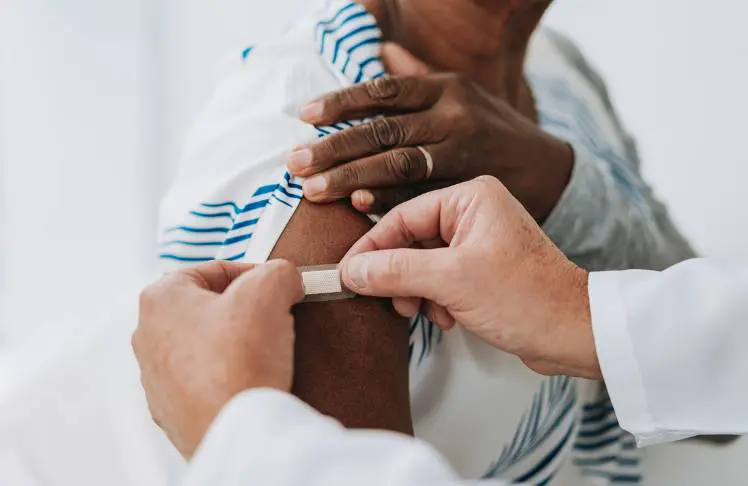
By Katia Hetter, CNN
(CNN) — For the first time, adults 60 and older are eligible to receive a vaccine against the respiratory syncytial virus, or RSV.
Although many people may have not heard of RSV, it’s worth knowing that the US Food and Drug Administration has approved two vaccines for this age group: Arexvy made by the drug company GlaxoSmithKline and Abrysvo made by the company Pfizer. The US Centers for Disease Control and Prevention has also given the green light to the vaccines following FDA approvals.
Since this is the first time an RSV vaccine has been made widely available, some older people may be wondering why it might be needed. Is RSV a major problem in adults, especially older adults? How effective are these new vaccines? How should it be timed in relation to the Covid-19 and influenza vaccines? And is there a similar vaccine to protect young children?
To help us with these questions, I spoke with CNN Wellness medical expert Dr. Leana Wen, who is an emergency physician and professor of health policy and management at the George Washington University Milken Institute School of Public Health. She previously served as Baltimore’s health commissioner.
CNN: Is RSV a major cause for concern in adults?
Dr. Leana Wen: While RSV is often thought of as a disease affecting children, this viral infection also poses threats to adults — in particular, to older individuals. In the United States, an estimated 159,000 adults 65 and older are hospitalized each year because of RSV. Tragically, around 10,000 to 13,000 older adults annually die from this infection.
A new analysis from the CDC shows that between February 2022 and May 2023, while older adults had fewer hospitalizations for RSV than Covid-19 or the flu, patients with RSV had more serious outcomes, including the need for intensive care and needing advanced respiratory support.
As with other infections, such as Covid-19, those most likely to experience ill effects are those who are immunocompromised and who have serious underlying medical conditions such as heart, lung and kidney ailments.
At the moment, the rate of seniors being hospitalized for RSV is about 6 out of 100,000, according to CDC data. This is uncharacteristically high for this time of the year and, in fact, is about 10 times higher compared with years before the Covid-19 pandemic.
The total number of hospitalized adults due to RSV is still relatively low, but to me the overall point is that this is a highly contagious respiratory virus that can cause real harm in vulnerable people. It’s a major breakthrough that there are now vaccines that can help protect against severe illness due to this virus.
CNN: How effective are the new vaccines?
Wen: The studies leading to the approval of the two new RSV vaccines are very promising. According to independent government analysis of company data, the vaccine from GlaxoSmithKline is 88% effective against severe RSV infection while the vaccine from Pfizer is 85% effective.
These are terrific results. We have to keep in mind the most important reason for getting vaccinated, which is to reduce the risk of hospitalization and death. Given the toll of RSV on vulnerable individuals, this is a very good level of protection, and people at risk for severe illness should discuss with their health care providers about obtaining the shot.
CNN: If someone gets the RSV shot now, will protection last through the winter, or do they need to get another shot later?
Wen: The RSV shot has good durability. Results thus far show that at eight to 12 months after the vaccine, the effectiveness of the Pfizer vaccine is still around 75%. After 18 months, the effectiveness of GlaxoSmithKline’s is more than 50%.
It’s possible that one RSV shot may last more than one season. In any case, it is not necessary to get multiple shots within a single year.
I also do not recommend that people who have decided to get the RSV vaccine to wait. RSV infections are rising now, and you want to get some immune protection prior to being exposed to RSV. If you get the shot now, the protection will last you throughout this season.
CNN: How should people choose between the two RSV vaccines?
Wen: The two vaccines have comparable levels of effectiveness. I would get whichever one is readily available at your pharmacy or doctor’s office.
CNN: How should the RSV shot be timed in relation to the Covid-19 and influenza vaccines?
Wen: People can receive the single-dose RSV vaccine at the same time as other shots. Someone could go to the pharmacy and receive all three shots — for flu, RSV and Covid-19 — at the same time. They could also receive them one at a time. It’s important to remember that people most likely to have ill effects from one of these viruses are also most susceptible to the others, so these are individuals who would most benefit from all three vaccines.
CNN: Can adults who are not yet 60 get the RSV vaccines?
Wen: Only those 60 and older are eligible at this time, with the exception of pregnant people, who are also able to receive the Pfizer vaccine during week 32 to 36 of pregnancy in order to convey antibodies to their babies. Other adults younger than 60 who are not pregnant are not able to access this vaccine.
CNN: Is there a similar vaccine to protect young children?
Wen: There are two options for protecting babies and very young children. The first is the vaccine administered to pregnant people. The second is a preventive antibody that can be given for infants younger than 8 months old who are born during or entering their first RSV season. This antibody may also be given to children up to 19 months old entering their second RSV season if they meet certain criteria, such as having a chronic lung disease or being severely immunocompromised. Both the maternal vaccine and the preventive antibody have been approved by the FDA and given the green light by the CDC.
Of course, as with every other aspect of your medical care, people who have further questions about the RSV vaccine should discuss it with their physician or other health care provider.
The-CNN-Wire
™ & © 2023 Cable News Network, Inc., a Warner Bros. Discovery Company. All rights reserved.















